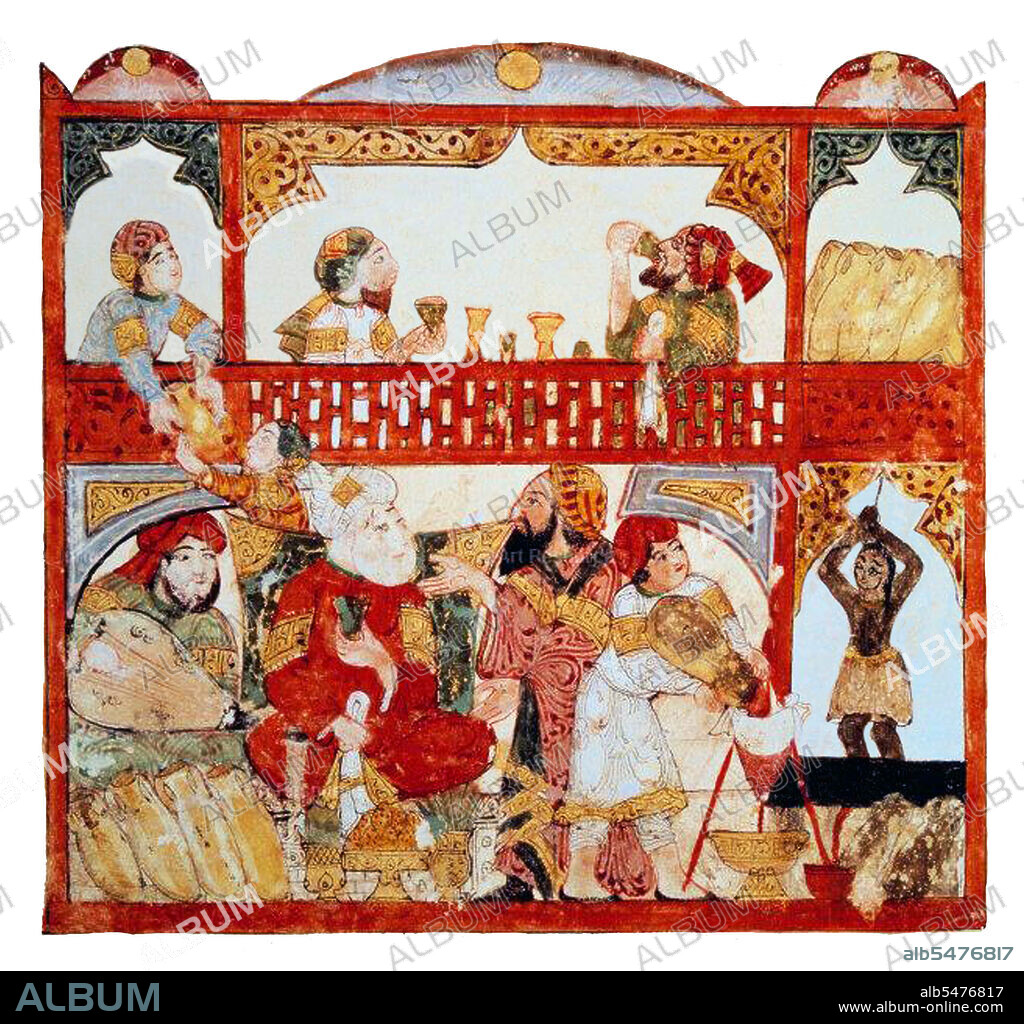alb5476817
Detail of a tavern with feasting upstairs, music and food preparation downstairs. On the right, a man pulls a fan.

|
Ajouter à une autre Lightbox |
|
Ajouter à une autre Lightbox |



Avez-vous déjà un compte? S'identifier
Vous n'avez pas de compte ? S'inscrire
Acheter cette image.
Sélectionnez l'usage:

Titre:
Detail of a tavern with feasting upstairs, music and food preparation downstairs. On the right, a man pulls a fan.
Légende:
Traduction automatique: Yahya ibn Mahmod al-Wasiti était un artiste arabe islamique du XIIIe siècle. Al-Wasiti est né à Wasit, dans le sud de l'Irak. Il était connu pour ses illustrations du Maqam d'al-Hariri. Les Maqama (littéralement « assemblées ») sont un genre littéraire (à l'origine) arabe de prose rimée avec des intervalles de poésie dans lesquels l'extravagance rhétorique est remarquable. L'auteur du Xe siècle Badi' al-Zaman al-Hamadhani aurait inventé cette forme, qui a été étendue par al-Hariri de Bassorah au siècle suivant. Le maqamat des deux auteurs est centré sur des personnages escrocs dont les errances et les exploits en s'adressant à des assemblées de puissants sont racontés par un narrateur. Les manuscrits du Maqamat d'al-Hariri, anecdotes d'un vagabond espiègle Abu Zayd de Saruj, étaient fréquemment illustrés de miniatures.
Yahya ibn Mahmod al-Wasiti was a 13th-century Arab Islamic artist. Al-Wasiti was born in Wasit in southern Iraq. He was noted for his illustrations of the Maqam of al-Hariri. Maqama (literally 'assemblies') are an (originally) Arabic literary genre of rhymed prose with intervals of poetry in which rhetorical extravagance is conspicuous. The 10th century author Badi' al-Zaman al-Hamadhani is said to have invented the form, which was extended by al-Hariri of Basra in the next century. Both authors' maqamat center on trickster figures whose wanderings and exploits in speaking to assemblies of the powerful are conveyed by a narrator. Manuscripts of al-Hariri's Maqamat, anecdotes of a roguish wanderer Abu Zayd from Saruj, were frequently illustrated with miniatures.
Crédit:
Album / Pictures From History/Universal Images Group
Autorisations:
Taille de l'image:
4331 x 4105 px | 50.9 MB
Taille d'impression:
36.7 x 34.8 cm | 14.4 x 13.7 in (300 dpi)
Mots clés:
ANT. OR.: IRAK • ARABE • ARABIE • ART (CATÉGORIE) • ART • ART, PEINTURE • ASIE • ASIE, CONTINENT • CHAPEAU TURBAN • CONTINENT ASIE • DISTRACTIONS • DIVERTISSEMENT • HISOIRE • HISTOIRE • IRAK • IRAK, ANT. OR. • ISLAM • ISLAMIQUE • ISLMAM • LOISIRS • MODE • MODE: MASCULINE • MUSULMAN • MUSULMANE • MUSUSLMAN • PEINTURE • RELIGION • STYLE • TABLEAU • TABLEAUX • TURBAN • TURBANS • VETEMENT: MODE • VETEMENT: TURBAN • YAHYA IBN MAHMUD AL-WASITI


 Pinterest
Pinterest Twitter
Twitter Facebook
Facebook Copier le lien
Copier le lien Email
Email
